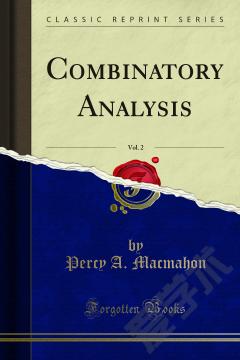Combinatory Analysis
Volume I of this work will not be found to overlap Netto's Combinatorik to any considerable extent.The latter excellent treatise treats for the most part of combinations of objects which are all different, and deals with many special investigations of interest concerning them. It is particularly good in the historical treatment, and the reader who desires a comprehensive account of combinatory analysis should read the Combinatorik, as well as the present book. Investigations by, amongst other writers, Weyrauch, Longchamp, Tait, Cantor, Terquem, Weiss, Metzler, Sprague, Scheck, Schroder, Steiner, Reiss, Moore, De Vries, Heffter, Kirkman, Lucas, are given by Netto, which are valuable, but are not within the scope of the task undertaken here. This has in view the presentation of processes of great generality, and of new ideas, which have not up to the present time found a place in any book in any language.This second volume commences with a detailed account of what is known concerning the algebra of the Theory of Partitions of Numbers, the point of view being that of Euler, and the first Section overlaps the Combinatorik to some extent. It does not include the investigations of Sylvester and Cayley in regard to expressions for the general coefficients in the enumerating generating functions. These are omitted as being arithmetical rather than algebraical. The reader is recommended to consult the original memoirs, and also a short account in the work of Netto.New ideas will be found in Section VII in regard to:(i) the transformation of certain series by a graphical method;(ii) the discussion of Ramanujan's important identities;(iii) the transformation of certain generating functions by means of symmetric functions;(iv) the connexion of the theory of partitions with other combinatory theories.The most important part of the volume, Sections VIII et seq., arises from basing the theory of partitions upon the theory of Diophantine inequalities.
{{comment.content}}








 京公网安备 11010802027623号
京公网安备 11010802027623号